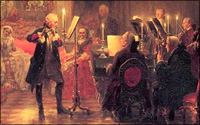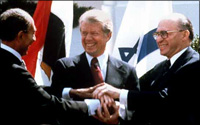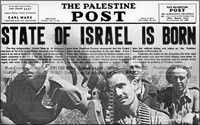 The events of the 18th century in Jewish life marked the beginning of modern Jewish history.
The events of the 18th century in Jewish life marked the beginning of modern Jewish history.
There are three personalities in particular who help define this era: Frederick the Great, Amschel Mayer Rothschild, and Moses Mendelssohn. All three lived in Germany, and each of them had a profound effect upon Western civilization, not just upon Jewish civilization.
Germany was the seat of Protestantism in Europe. It is where the Protestant Reformation began. From the moment of the Protestant Reformation onward, Europe became less and less religious. And that raised a new culture — the culture of secular Enlightenment, of Humanism, of the attempt by man to straighten out his problems without Godly reference or interference.
In the Middle Ages, and as long as the Church held sway in Europe, the policy of governments was not to try to right the wrongs of the society. Somehow, those wrongs were sanctioned by God (otherwise, they wouldn’t be there). As idiotic as that sounds, that was the belief of medieval man. Medieval man was preoccupied with Paradise and Hell. Take a look at medieval art: it is filled with depictions of angels and devils. Only the top echelon of society — the kings, emperors, knights and very wealthy — had any real interest, so to speak, in this world. Everybody else was only working for the next world.
The Church, to a great extent, encouraged that process. It fit in with Christian theology, which was always other-worldly oriented, and it helped justify some of the awful things that the Church did.
With the coming of the Protestant Reformation that type of thought system began to change. The age of Enlightenment in the 1700s is that period in Western history when the thought process changed completely, and where civilization collectively said, “This world counts.”
Not only did it count, but there were many people who said, “It’s the only world. There is no other world. That’s just Church propaganda.”
Therefore, they focused on fixing up this world. Furthermore, not only was it incumbent upon human beings to fix it up, but they were the only ones who could fix it. Either there was no God, or if there was, He did not interfere. Therefore, it was within our hands to improve the lot of man.
It is not an accident, therefore, that many of the founding fathers of the United States — the people who wrote the Declaration of Independence and fought in the American Revolutionary War — were agnostics or atheists. That includes Benjamin Franklin, Thomas Paine, Thomas Jefferson and the Adams brothers. They were all non-believers. Even though America is a Christian country — and stamps its money with the words “In G-d We Trust” — the separation of Church and State is ironclad.
In France, the revolution was the product of Voltaire and Rousseau — non-believers, atheists, bitter anti-clericalists and haters of the Church who in their own way were as oppressive as the Church was. When Marx said religion was the opiate of the masses, he expressed the idea of secular Humanism. He and the others saw religion as a hindrance to human progress. Religion, as it came down from the medieval times, only lulled people into not doing anything to improve their lot, not attempting to rebuild themselves, to make a new world. Therefore, religion was the enemy of progress in terms of politics and social progress.
Frederick the Great
Germany in the 18th century was made up of small principalities. At one time, there were as many as 80 German princes, each ruling a little piece of Germany. It was a fractious country. That was best for the rest of the world, because once Germany united, the world embarked on almost 85 years of war.
Frederick I, who was the grandfather of Frederick the Great, formed a small empire out of the area around Berlin, Brandenburg, and Prussia. When Frederick I died he left the throne to his son, Frederick William, who was not much of anything. The father, in fact, on his deathbed said, “What a nincompoop they are going to have for a king.” However, Frederick William had a number of sons, and his third son was Frederick II, who would be called Frederick the Great.
He was raised to be a military man and an autocrat—but that was not his nature. He was a very great intellectual as well as a musical composer. He was a person of emotion, of great culture.
He was impressed by the ideas of the 18th century — of Humanism, of the improving the lot of the country. The emperor was, as he said it, “Not the first officer of his people, but the first servant of his people.”
Frederick the Great was impressed by the ideas of liberalism that existed in the rest of Europe, and he decided, in one of his strange decisions, that the area in which the matter could be tested best was on the Jews, since the Jews were the most downtrodden. They were people who had no civil rights, and who lived under terrible oppression.
A New Type of Anti-Semitism
Given what we know about the Holocaust, it is ironic— “ironic” is not a strong enough word—that the first country in Europe where Jews gained any sort of political or social freedom or rights was Germany. In fact, Germany was the leader in human rights in terms of Europe. A great deal of the French Revolution, which brought freedoms to the rest of Europe, especially to France, was patterned upon German ideas, influence and methods.
Nevertheless, for all Frederick’s good intentions it was this decision of granting rights to the Jews that introduced a strange phenomenon which still exists in the modern world: racial anti-Semitism.
Whereas the anti-Semitism of the Middle Ages was almost entirely religious, the anti-Semitism of the modern world is not. The idea was articulated sharply by Moses Hess, a colleague of Karl Marx. Although Hess was assimilated and non-observant, he considered himself Jewish. He wrote in his book, Rome and Jerusalem, “The Germans hate us not because of our peculiar religion but because of our peculiar nose.”
That is the difference between medieval anti-Semitism and the anti-Semitism of the modern world. The anti-Semitism of the modern world is racial, genetic. It has to with Jews, not with what Jews believe.
Racial anti-Semitism helps explain the paradox how a man like Frederick the Great could open the door for Jews in Germany while at the same time feel that the Jews were an inferior people. He was not a friend of the Jews, but he experimented with allowing the Jews rights because that was the direction secular Humanism was going.
Moses Mendelssohn
Frederick’s son, William I, befriended a strange Jewish philosopher. Through the Crown Prince this philosopher gained entry into the court of Frederick the Great and became one of the most well-known intellectuals in all of Germany. His name was Moses Mendelssohn.
Many times history judges people far differently than their contemporaries. Moses Mendelssohn today, at least from the perspective of traditional Jewry, is not only portrayed as persona non grata, but as a traitor and someone who brought a great deal of destruction to the Jewish people. However, that is not how he was viewed by his contemporaries, even the traditional ones. In his time, Mendelssohn wrote questions to many of the great rabbis, and they answered him with respect.
None of these rabbis foresaw that 30 years down the line Mendelssohn would be considered the founder of a radical anti-traditional movement and that all his grandchildren – as well as many of those of his movement — would convert to Christianity.
Mendelssohn was born in the city of Dessau. At an early age, he enjoyed the reputation as a genius and for being a great Talmudic and Biblical scholar. His father was a scribe and he was one of the few who benefitted from Frederick the Great’s experiment.
One of the first experiments was to allow Jews to enter schools of higher secular learning. Until that time, it had been forbidden for Jews to attend what they called the “gymnasium” or superior high school, and certainly not university. Under Frederick the Great for the first time the doors were opened and Mendelssohn enrolled.
He went to the university in Berlin, and other places, received degrees, learned Latin and Greek, and engaged in some of the greatest philosophical debates of the time. Mendelssohn was seen by the non-Jewish secular world as the defender of the Jewish people, and he saw himself in that role as well.
Mendelssohn himself was an observant Jew. He wrote in a memoir that he was once late to visit the Emperor because he had to pray the afternoon prayer, and it was just before sunset. He mentions offhandedly that he never missed the afternoon prayer in his life and he wasn’t going to miss one now. So he went late to the Emperor.
The Errors of his Way
Despite his personal commitment to observance, he made a number of fundamental errors.
The first was that he thought that every Jew could be Mendelssohn. He really thought that every Jew could do what he did: engage in secular studies, rub shoulders with aristocrats and kings, debate philosophy and stay true to Torah values. He did not realize that for everyone else it would be the beginning of a greased slide away from Judaism.
A second thing that he obviously did not see was the pressure for getting out of the ghetto. The ghettos of Europe were not pleasant, and the Jews wanted to get out, which meant, to a great extent, dropping many of the traditions and ways of life that they had in the ghetto. The fall of the ghetto walls in Germany led the vast majority of German Jews to discard Jewish life completely.
Mendelssohn was also at the forefront of the movement away from Jews using their uniquely distinct language, Yiddish, and replacing it with German. He did so by composing a translation of the Bible into German, which many people said was far better than Martin Luther’s, even though Luther’s translation is the main translation of the Protestant Church. The introduction of German as the language of the Bible, or as the language that scholars and teachers taught Torah in, was a radical departure. In Jewish circles, until then it had been taught in Yiddish. A German translation of the Bible, along with German-speaking teachers, represented a radical departure.
A century later, Rabbi Samson Raphael Hirsch, in effect, reaped all the benefits of these changes but kept the people Torah observant, i.e. Orthodox. Rabbi Hirsch had also translated the Bible into German. His followers also spoke German, dressed like the Germans, got a secular education (in the Realschule in Frankfort) and integrated themselves into German society. They were part of Germany, but they were devotedly religious and Orthodox.
That was 100 years later. When the genie was let out of the bottle here in the middle of the 1700s, it was a complete destruction.
It also became fashionable for a short period of time, until German anti-Semitism set back in, for German intellectuals to marry Jews. That provided a rate of intermarriage that in a short period of time proved astonishing. Also, it led to a great many conversions of German Jews to Christianity. These dramatic changes took place within a short period of time and can be traced to the personage of Moses Mendelssohn.
Amschel Mayer Rothschild
The third person whose influence had a major impact on the period is Amschel Mayer Rothschild.
Rothschild’s success in the late 1700s in establishing the main international banking firm in Europe, and of being able also in a relatively short period of time to reach a position of enormous prominence throughout Europe, propelled Jews into this assimilatory process, even though he himself was a very observant Jew. Everybody thought that he could be Rothschild. That underlying belief, combined with the pressures of secular Humanism of the 18th century, is what brought about the birth of Reform and its enormous success for its first 150 years.
The Reform today is a different brand completely. We will discuss the movement next time, but it is important to understand that it was a radical departure in Jewish theology. It made a completely different religion out of Judaism, to the degree that it was almost unrecognizable.











